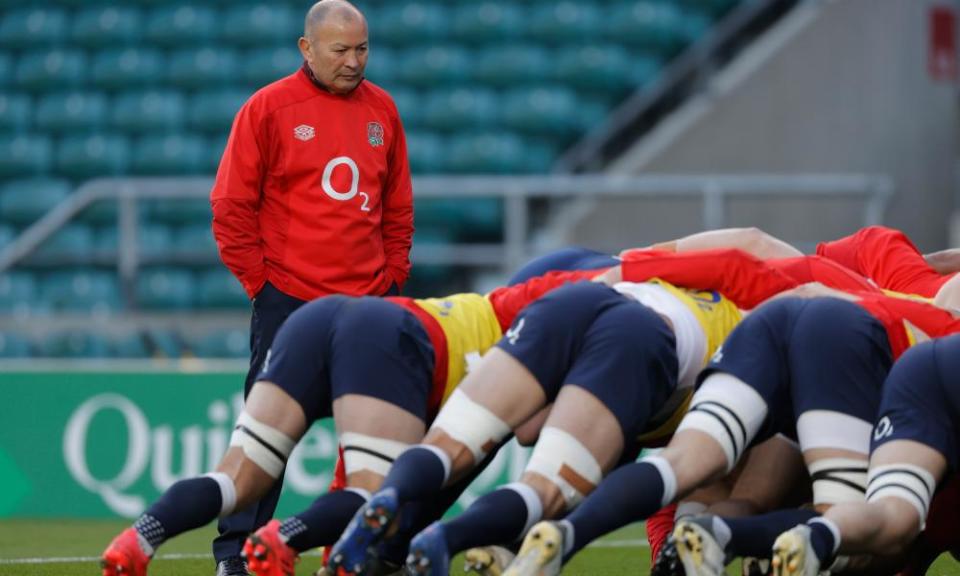'Standout candidate': Eddie Jones on Ed Robinson's England coaching role

Eddie Jones has often picked players he calls apprentices in his squad, but until this week the England head coach had preferred experience in his management team.
When Jason Ryles, the Australian who took over as skills coach last autumn, said he would be unable to return for the Six Nations for family reasons, Jones wasted no time in naming Ed Robinson as his stand-in for the tournament. Few outside the Jersey Reds, where he is the attack coach, had heard of someone who turns 28 in the week of England’s championship opener against Scotland on 6 February.
Related: Six Nations teams need to show more adventure – but don't hold your breath | Paul Rees
“I first met him at Bristol when his dad [Andy, the former England head coach] was the director of rugby,” said Jones. “During the first lockdown I helped to mentor a number of young coaches and we had weekly meetings. Ed was one of them and probably the most impressive. When we had this short-term vacancy, he was the standout candidate and Jersey were very generous in allowing us to use him. It is a good fit all round.”
Jones’s choice was limited given the start of the Six Nations was little more than two weeks away when Ryles said he would be remaining in Australia. Travel restrictions meant looking abroad was not an option, while no Premiership club was likely to release their coaches. Which left him with the choice of an emerging coach, such as Robinson, or taking on the responsibility himself.
Jones was asked whether England would be more adventurous after an Autumn Nations Cup campaign when their dominance at forward was an invitation to kick rather than spread the ball wide. He bristled and said: “I am not going to explain any more why the game is as it is. You’re entitled to your opinion and your judgment. That is the great thing about rugby and the more you express that opinion, the more people read about it and the better it is for rugby.”
Robinson, who retired from playing at 19 after suffering multiple concussions, has developed a reputation at Jersey as being attack-minded and innovative. He recorded a podcast two years ago when he talked about creating tries from your own line, challenging players so they made rugby decisions and why big life decisions did not need to be risks.
Robinson will not play a leading role but Jones is an ideas man. In recent weeks, he has had conversations with Sir Dave Brailsford, the former performance director of British Cycling, and Arsène Wenger, Arsenal’s manager for 22 years until 2018.
“I felt embarrassed at being at the same table as someone with Dave’s thought patterns, the way he thinks about preparations and taking a team forward,” said Jones. “Wenger has a wealth of experience in how to manage teams and the longer you stay in the job what you have to do to keep your team growing. I picked up some ideas from him.”
Jones is the longest-serving head coach in the Six Nations and one of two survivors, along with Scotland’s Gregor Townsend, from the 2019 World Cup. He has led England to three Six Nations titles and the 2019 final, while they won the Autumn Nations Cup last month.
“Winning and losing are habits, part of the cycle of being a team,” he said. “We are on a winning run and it gives players a good feeling which makes them give a bit more, training harder and playing better.
“In 2018, we failed to recover from losses because we did not know how to deal with them. Handling being a winning team is about having that absolute hunger to keep getting better and never being satisfied.”

 Yahoo Finance
Yahoo Finance 